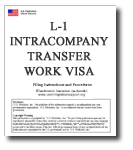 The H-1B visa is well-known in technology circles: U.S. employers use it to hire temporary foreign workers in “specialty occupations.”
The H-1B visa is well-known in technology circles: U.S. employers use it to hire temporary foreign workers in “specialty occupations.”
Engineers and Information Technology (IT) workers have long complained that the H-1B program takes jobs away from Americans. While H-1B requires employees to be paid the prevailing wage, some argue that employers actually pay lower salaries to H-1B workers — and that this depresses salaries across the board.
Enter L-1: A dog of a visa?
While there is a cap on the number of H-1B visas issued in the U.S., there is no cap on the L-1 visa, which has no prevailing wage requirement.
 The L-1 visa is used by foreign companies for intra-company transfers of foreign employees into the U.S. L-1 workers are supposed to have “specialized knowledge” — but my dog could claim that his nose enables him to fulfill that requirement.
The L-1 visa is used by foreign companies for intra-company transfers of foreign employees into the U.S. L-1 workers are supposed to have “specialized knowledge” — but my dog could claim that his nose enables him to fulfill that requirement.
Use of the L-1 visa is growing, in part because the definition of “specialized knowledge” makes it easier to abuse.
Leading work to other countries?
Computerworld reports in an article, Charting H-1B users, as attention shifts to L-1, that, according to the Economic Policy Institute (EPI), L-1 could start resulting in significant job losses for Americans. EPI warns of “offshore outsourcing firms whose business model is to first hire L-1 workers to learn the work done by Americans, then to transfer that work overseas.”
Says an EPI analyst: “The L-1 program was not intended to function in this way. Nevertheless, this blatant misuse of the program is legally permissible. As a result, the program is operating at the expense of American workers.”
 The issue: The U.S. government is considering changing the definition of “specialized knowledge,” and EPI is warning that the new definition could cause new, more extensive job losses. Are American jobs being led out of the country on L-1 leashes? I mean, L-1 visas?
The issue: The U.S. government is considering changing the definition of “specialized knowledge,” and EPI is warning that the new definition could cause new, more extensive job losses. Are American jobs being led out of the country on L-1 leashes? I mean, L-1 visas?
Meanwhile, foreign companies that want to transfer more of their employees to work in their U.S. facilities complain about the restrictions.
Have you encountered L-1? Is it the new H-1B?
: :
